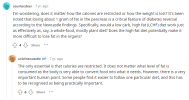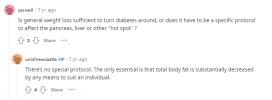And, happily, the data from these real experts confirmed the findings of Counterpoint. The average weight loss achieved by people just armed with the basic information was the same as in Counterpoint – 15kg. At home and at work, going about their daily lives, people had replicated our research findings. And what emerged was that it was the weight loss that mattered, not the particular diet the participants went on or how they did it. Around half of the group had used a liquid formula diet – as in Counterpoint – and the other half had merely cut back drastically on their normal eating. A high proportion had sought individual advice as advised on our website and had been told by their doctor or diabetes nurse in no uncertain terms not to try to lose weight rapidly. But they were so highly motivated to get rid of their diabetes that they had emailed me on hearing news reports, and understandably they had gone ahead anyway.
Prof Roy Taylor - Life Without Diabetes 2019




